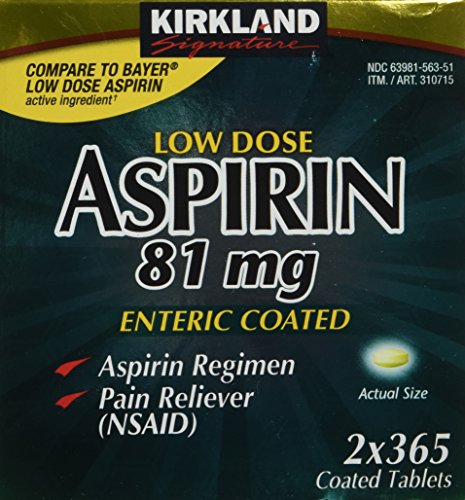Pregnant women are prone to serious condition known as preeclampsia and they should take aspirin in very low dose every day once their first trimester get over. Daily dose of 81 milligrams of aspirin in middle of your pregnancy or late pregnancy can reduce the cause of preeclampsia to a large extent in such women. It is also helpful in reducing the low weight during birth and preterm birth risk that results from conditions like pregnancy.

Preeclampsia is quite common cause that leads to health problems in both mother and baby. Taking daily dose of aspirin can help prevent the serious condition and is favorable for both mother and the baby.

Preeclampsia is a serious condition that is seen in pregnant women, which cause excess protein in their urine and high blood pressure after period of 20 weeks of their pregnancy. It is very important to prevent the serious problem of preeclampsia as the only thing that can stop preeclampsia is only delivery which again can be risky if performed prior to gestation of 34 weeks.
Pregnant women who suffer from preeclampsia can get life threatening stroke or damage in organ. The growth of unborn fetuses becomes too slow and this condition keeps the baby deprived of nutrients and oxygen, which results in low weight of the baby at the time of birth, preterm or still birth. The growth of the baby goes on slowly to such an extent that either the baby is small or needs the baby to deliver early in order to save mother as it can lead to stroke.
Women suffering from preeclampsia can be categorized into 3 categories having
- Had preeclampsia in earlier pregnancies
- Have high diabetes or blood pressure even before pregnancy.
- Are having, triplets, twins or multi-birth pregnancies
A doctor can recommend use of aspirin on a daily basis for those women who are at risk of 2 or more moderate serious factors. These women are those who
- Having first baby
- More than 35 or black
Taking low dose of aspirin daily certainly can reduce problems like preterm birth by almost 14% and slow growth (fetal) by nearly 20% and also helps reducing overall preeclampsia by 24 per cent.
There has been no evidence seen of any potential risk of low dose of aspirin taken daily by pregnant women having preeclampsia. However, any expectant mother should consult a doctor before starting the low dose of aspirin so that you start with a safe aspirin regime.
Doctors recommend that women should not just buy aspirin and start taking aspirin with low dose without consulting their concerned prenatal provider whether they can take aspirin and will not face any risk. Taking medicine without consulting doctor should be avoided by women and women should take recommended dose under doctor’s guidance and consultation.
Aspirin come with benefits but it has its own risks, especially in pregnant women.
One should understand the risk associated with self medication and should always see a doctor.
Aspirin for Pregnant Women: What You Should Know
Aspirin (acetylsalicylic acid) is commonly used as a pain reliever and anti-inflammatory medication, but its use during pregnancy requires careful consideration. Here’s what you need to know:
1. General Use During Pregnancy
- Low-dose aspirin (usually 81 mg/day) is sometimes prescribed during pregnancy.
- Regular-dose aspirin (325 mg or higher) is generally not recommended, especially in the second and third trimesters.
2. When Low-Dose Aspirin Is Recommended
Doctors may recommend low-dose aspirin in specific situations to improve pregnancy outcomes, including:
- Preeclampsia prevention: Especially in women with high-risk factors like chronic hypertension, diabetes, kidney disease, or a history of preeclampsia.
- Recurrent pregnancy loss
- Certain clotting disorders: Such as antiphospholipid syndrome.
- Poor pregnancy outcomes in the past: Such as intrauterine growth restriction (IUGR) or stillbirth.
3. Risks of Aspirin Use in Pregnancy
- Early pregnancy: High doses may increase the risk of miscarriage or congenital defects.
- Late pregnancy: May cause:
- Premature closure of the fetal ductus arteriosus (a vital heart vessel)
- Reduced amniotic fluid
- Complications during labor or delivery
4. Timing Matters
- Before 12 weeks: Low-dose aspirin is sometimes initiated to prevent preeclampsia.
- After 36 weeks: Often discontinued to avoid bleeding complications during delivery.
Always follow your doctor’s advice on when to start and stop.
5. Do Not Self-Medicate
- Do not take aspirin during pregnancy unless your healthcare provider specifically tells you to.
- Alternatives like acetaminophen (Tylenol) are generally considered safer for general pain relief during pregnancy.
Summary
| Use | Safe? | Notes |
|---|---|---|
| Low-dose aspirin | Often safe if prescribed | Used to prevent complications like preeclampsia |
| Regular/high-dose | Not recommended | Risk of miscarriage, fetal harm, bleeding |
| Self-medication | Not safe | Always consult a doctor |

Treating clogged arteries
Doctors can prescribe medicines to treat atherosclerosis. These include:
antiplatelet medication, such as aspirin or clopidogrel, to reduce blood clotting anticoagulants, such as warfarin or heparin, to thin the blood cholesterol-lowering medicines, such as statins blood pressure medicines
Sometimes, a doctor needs to perform surgery for atherosclerosis. This may include balloon angioplasty or a stent to open a blocked artery. Healthcare professionals can treat angina with a coronary artery bypass. The doctor grafts a piece of a healthy vein to an area above the blockage to allow blood to flow.